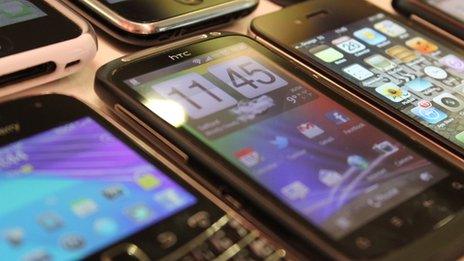Firm fined over Angry Birds and Cut The Rope scam
- Published

A firm has been fined 拢50,000 over smartphone apps which tricked people into receiving premium rate text messages.
More than 1,000 people were hit with unexpected bills after downloading fake versions of popular games like Angry Birds.
Industry watchdog PhonepayPlus says malicious apps are a "growing threat".
A Latvian firm has been ordered to pay the fine, the first of its kind, and refund another 拢28,000 to mobile users.
Several apps appeared in Google's Android Market (now known as Google Play) last November.
They were designed to look like free versions of games like Angry Birds, Assassin's Creed and Cut The Rope.
When people downloaded the trick apps they wouldn't open.
Instead they received three SMS messages costing 拢5 each, although the texts were hidden so people had no idea what had happened until they checked their bills.
Malware
It happened to John Gladstone from Southampton.
The 31-year-old engineer bought his first smartphone just before Christmas.
"I was full of excitement," he said. "I opened the box and downloaded every app that I could see on the Android market which had good reviews or if I recognised the name."
John Gladstone was conned after he downloaded a rogue Android app
He only realised he'd been conned when his phone provider told him he'd been sending premium messages.
"I'm always quite careful with my phone," he said. "I never use it for internet banking, but I didn't count on the fact that there's another way people can get your money."
Nitin Lachani researches threats for PhonepayPlus and says it is a constant battle to keep up with the scammers.
"It is hectic," he said. "These guys are coming up with more and more sophisticated malware.
"There is a wider issue here. There is malware out there which can gain total access to your phone.
"A cyber criminal could then deliver apps to your phone which could tap into your phone calls, your messages.
"You've got to be think that phones are like computers and there is a massive link to your phone bill or potentially your credit card."
This scam only affected Android users. Google does not check applications before they appear on its app store, Google Play.
Rivals Apple and Blackberry both review apps before they are made available to download.
Google says apps which violate its policies will always be removed from Google Play, as happened in this case.
- Published28 March 2012
- Published18 November 2011
- Published15 February 2011